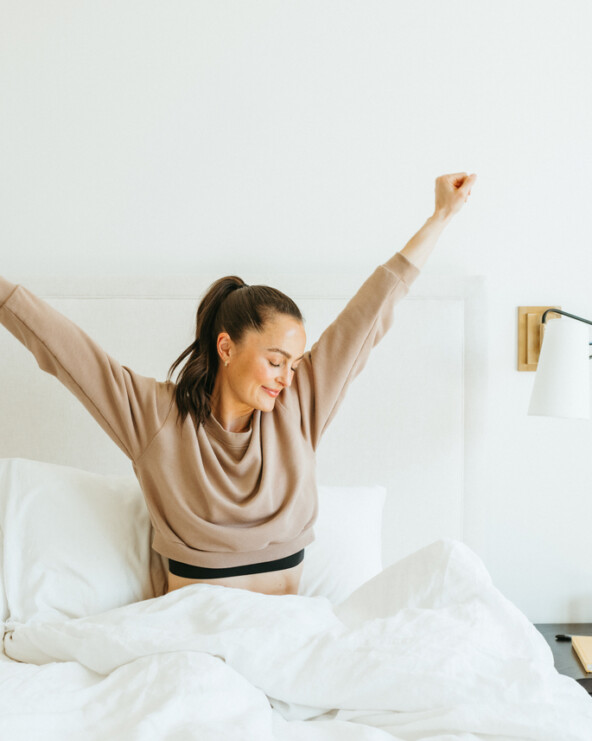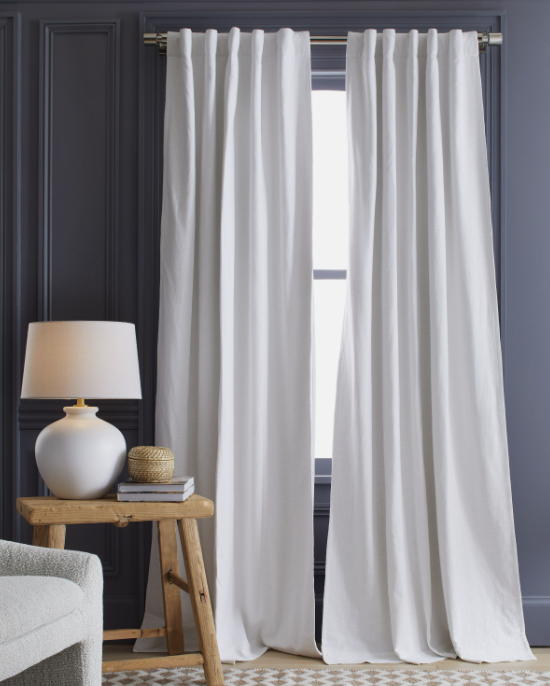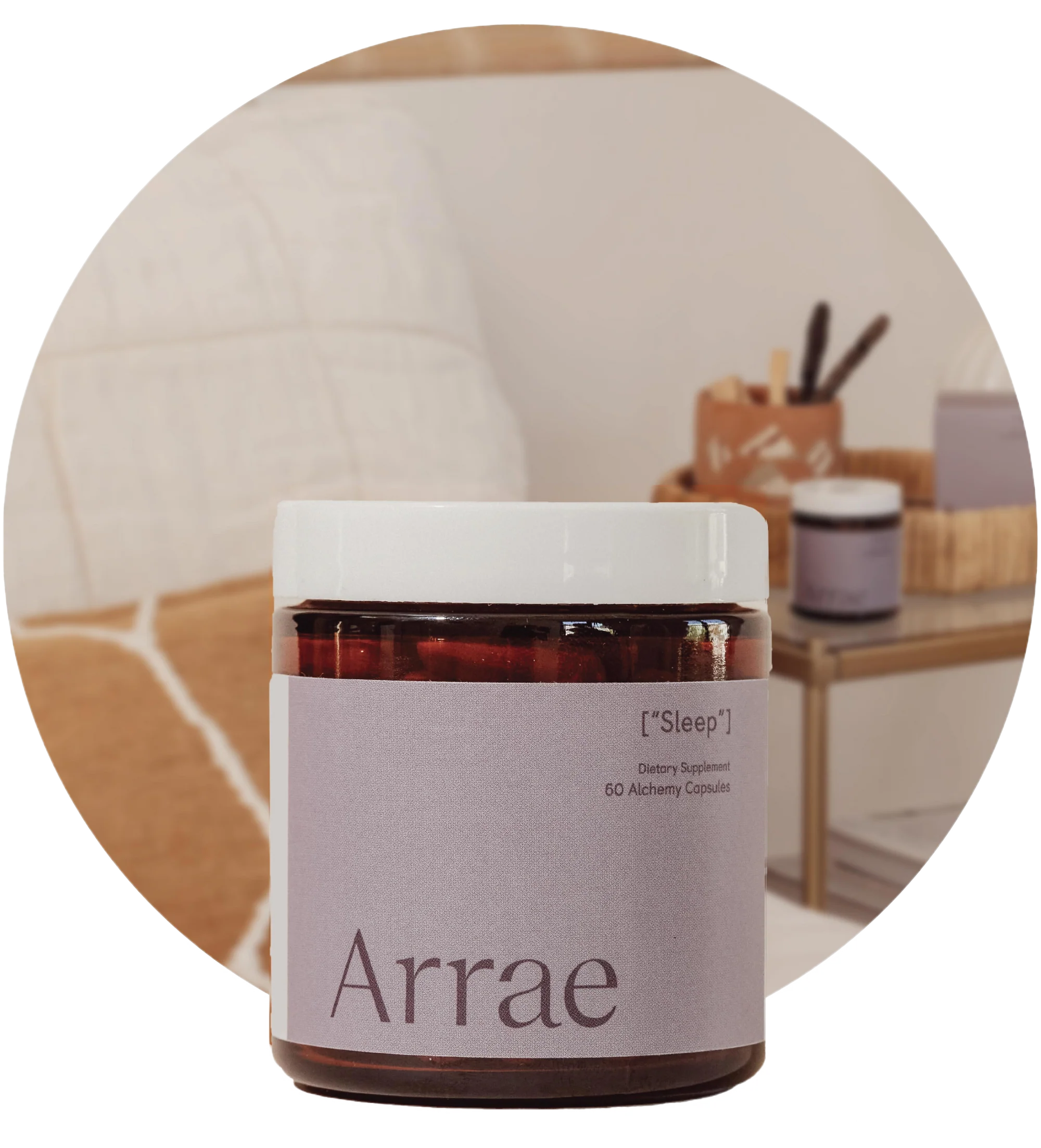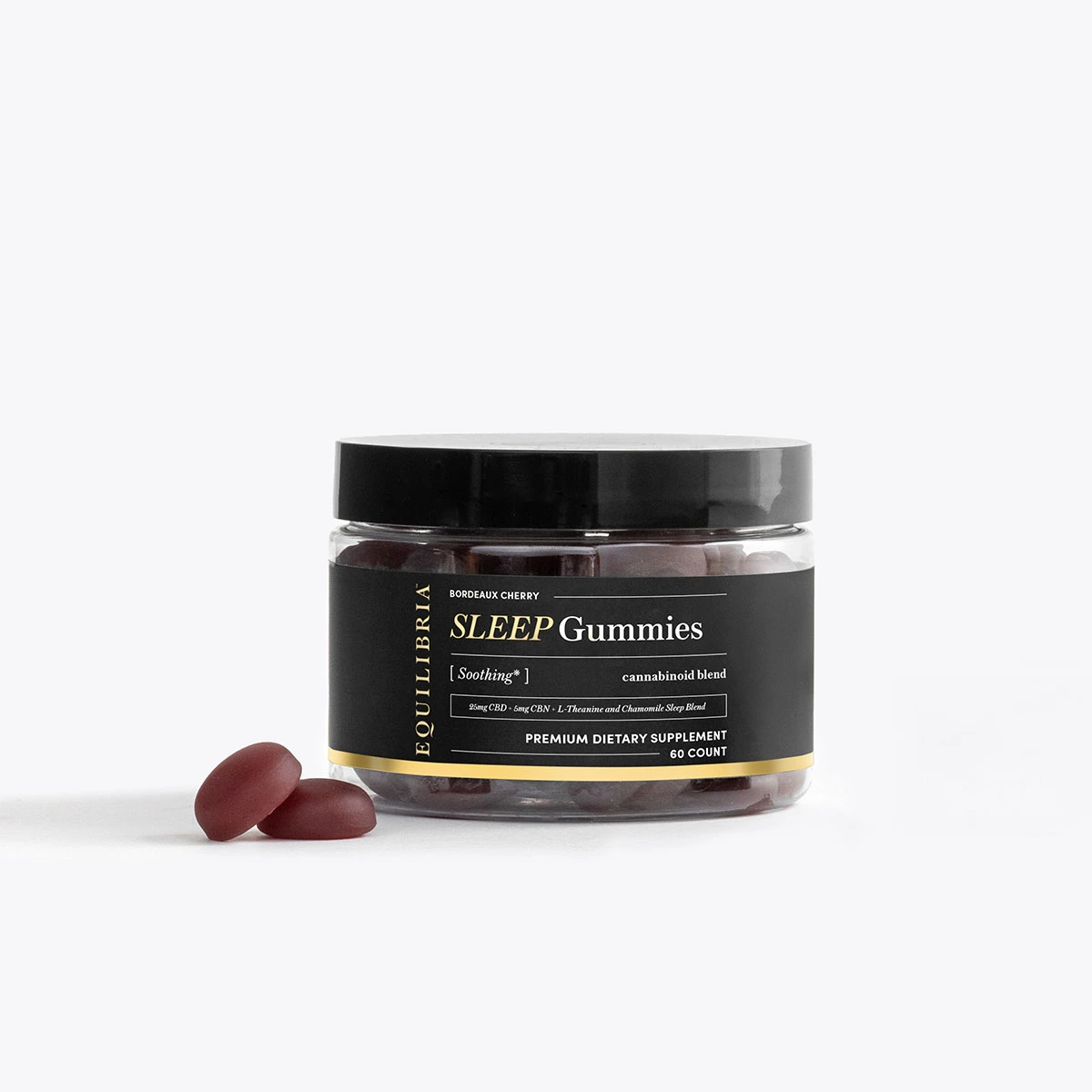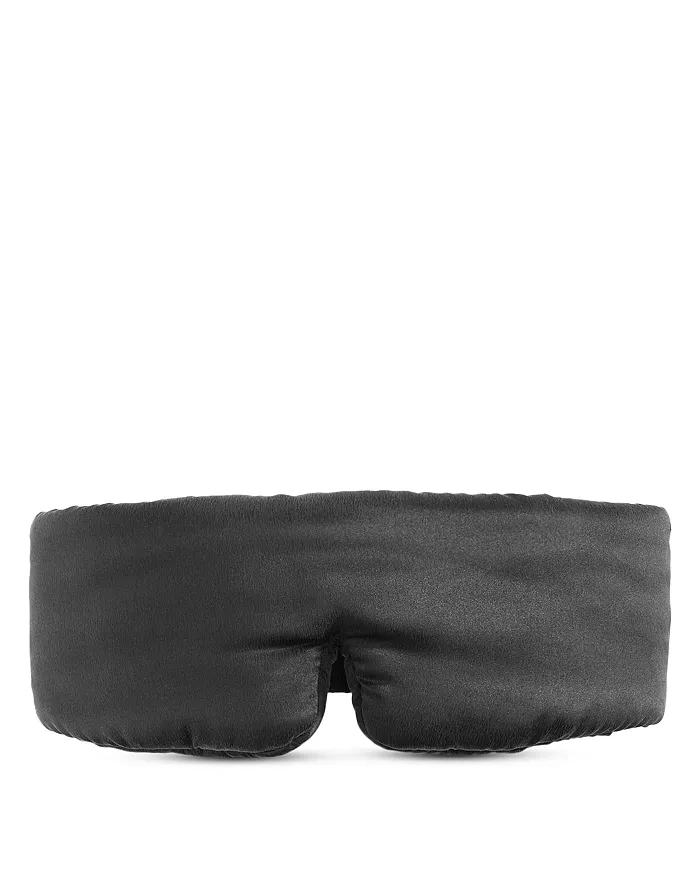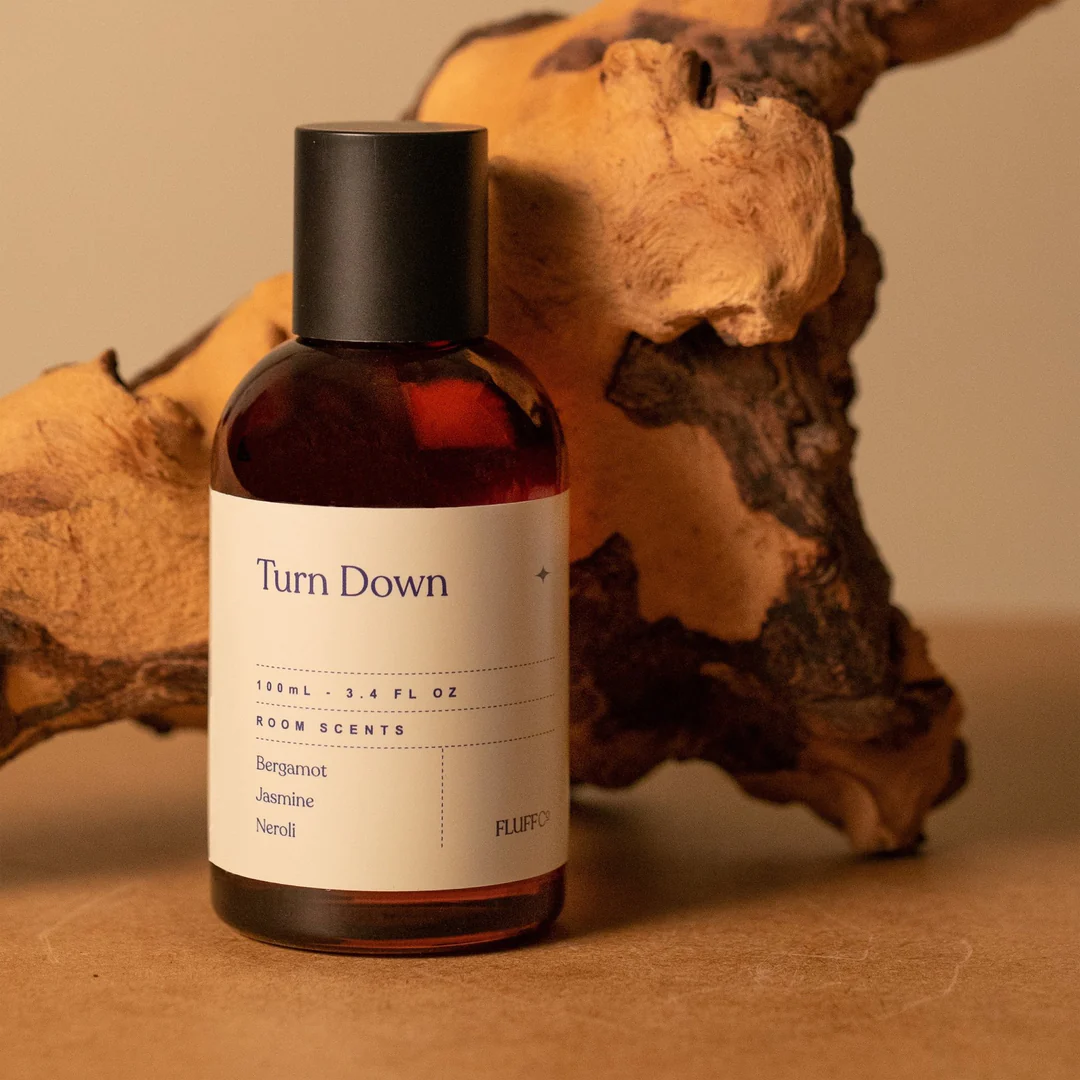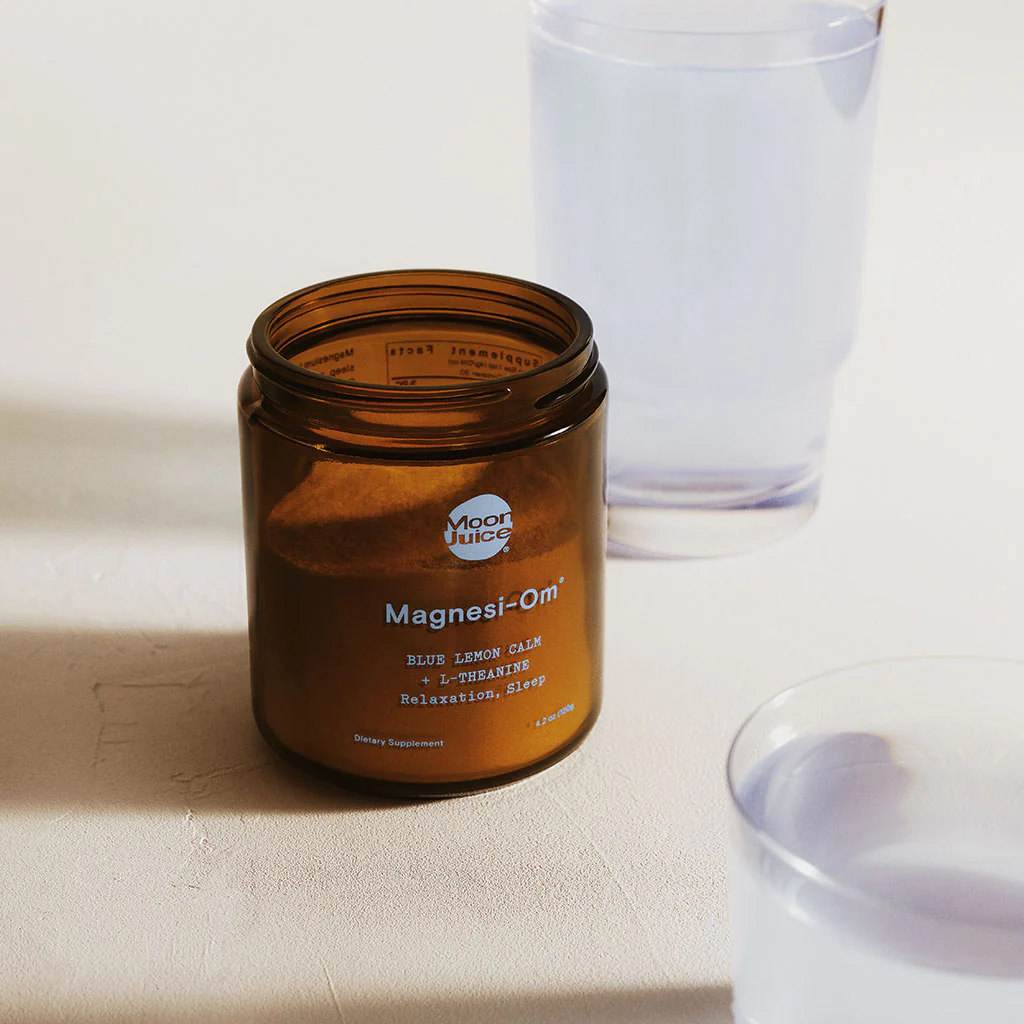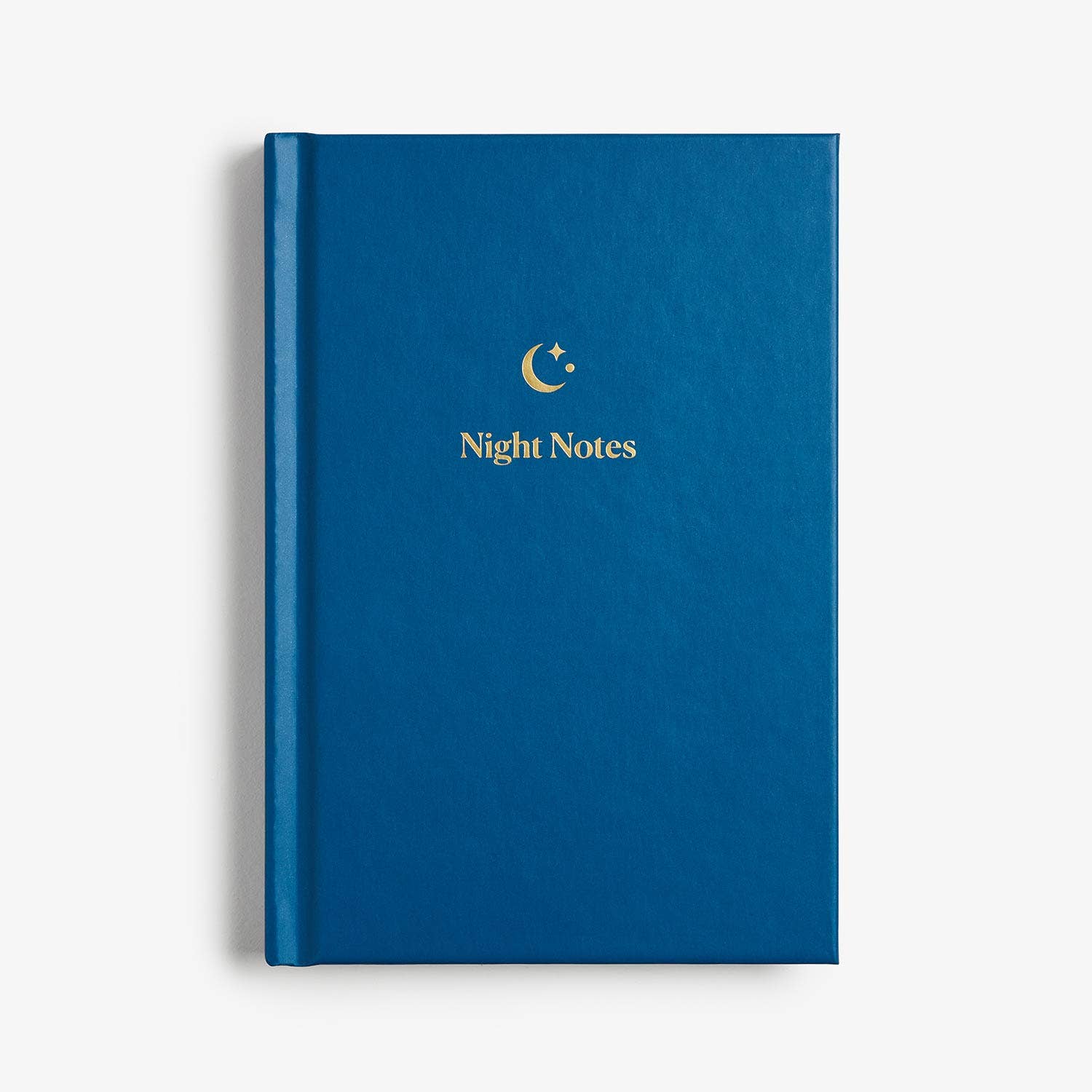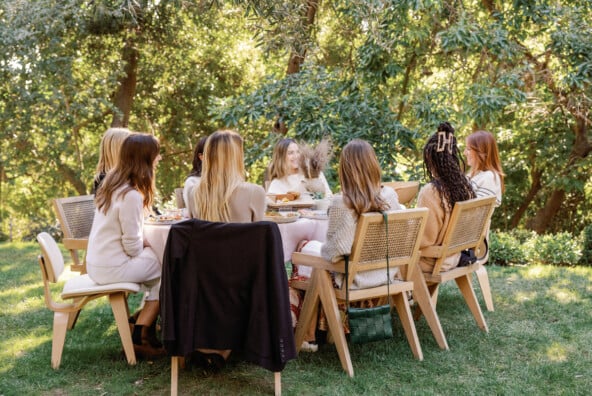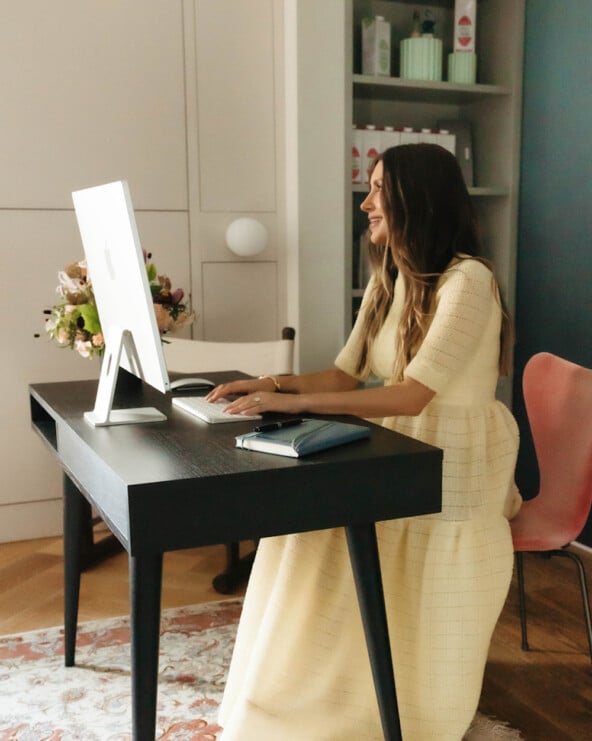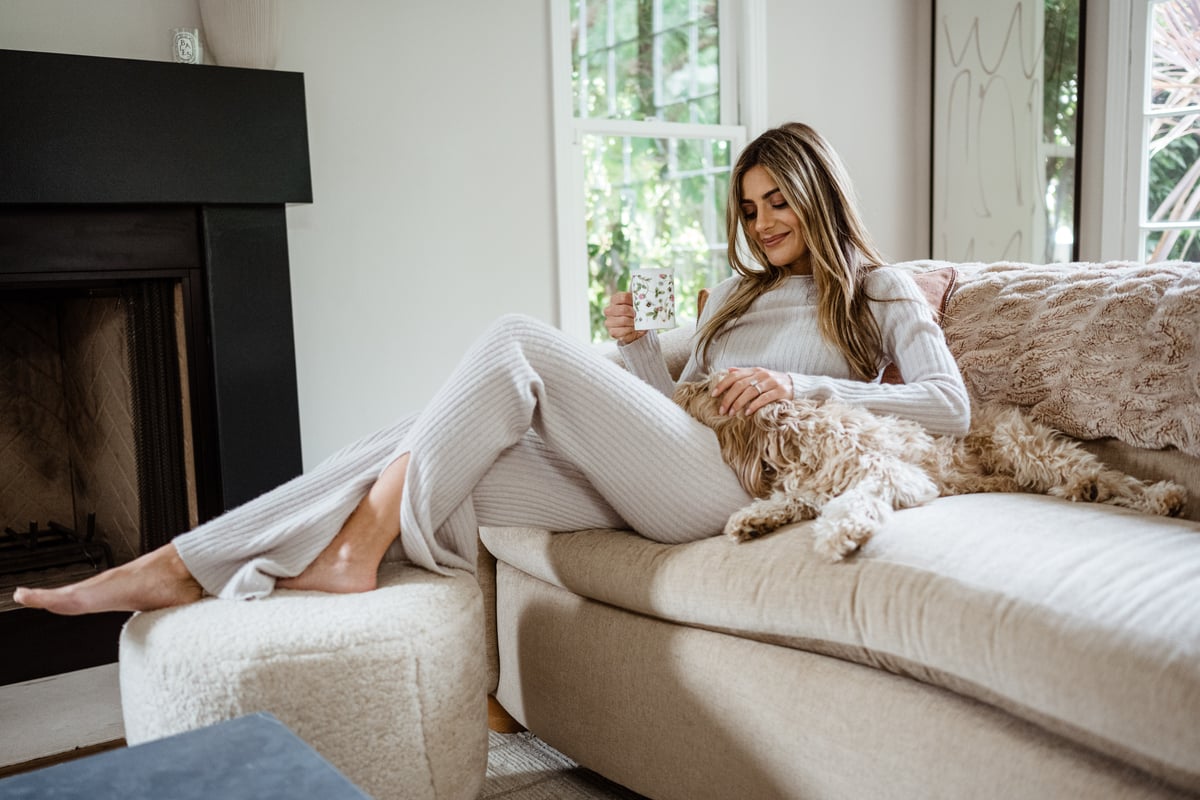Even before Arianna Huffington convinced the world that sleep was cool, we’ve long obsessed over improving our snooze. From falling asleep faster to resetting our circadian rhythms to getting to the bottom of why we’re so dang tired all the time—learning how to sleep better is a journey all of us at Camille Styles happily find ourselves on.
I write “journey” because here’s the truth: some mornings, you’ll wake up feeling refreshed and ready to go. Others? You’ll wonder if eight restorative hours is a pipe dream at best. Knowing how to sleep better is a key wellness essential, but there are plenty of rest disruptors outside of our control. So don’t stress about getting a perfect night’s sleep—there’s no such world. Instead, arm yourself with the science-backed info that makes waking up with new energy and inspiration a reality, and our insomnia-riddled nights a thing of the past.
Featured image from our interview with Megan Roup.
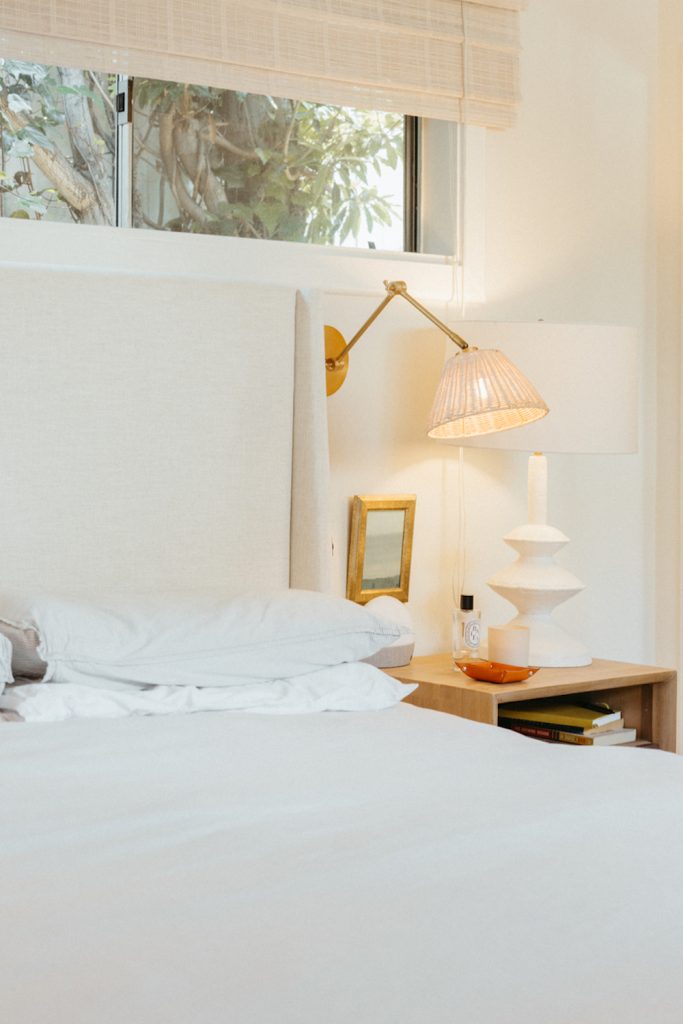
How to Sleep Better: A Step-by-Step Guide
To set you up for sleepy success, I spoke with Preeti Chahal, Certified Wellness Coach – PharmD of Equilibria. As a brand focused on pairing effective wellness supplements with one-on-one coaching, I trusted their wellness coaching team to be the perfect resource to tap.
Ahead, Preeti and I discuss all the pillars of a good night’s sleep. Learn how to design the calming haven of your dreams, ideas for keeping stress at bay, and more. Plus, scroll to the end for sleep products that help you double down on rest.
Signs and Symptoms You Need to Improve Your Sleep
A great place to start. Because really: even though everyone’s talking about getting more/better sleep, it’s very well possible that you’re already doing exactly that. But if you suspect your zzz’s could use a little TLC, Preeti shares common signs of poor sleep:
- Taking more than 30 minutes to fall asleep at night.
- Regularly waking up more than once per night.
- Feeling tired and having difficulty concentrating during the day (causing you to reach for more caffeine).
- Physical signs like skin breakouts, puffy eyes, or dark circles.
- Feelings of hunger especially for junk food and unintended weight gain.
- Feeling more stressed, emotionally exhausted, angry, or irritable.
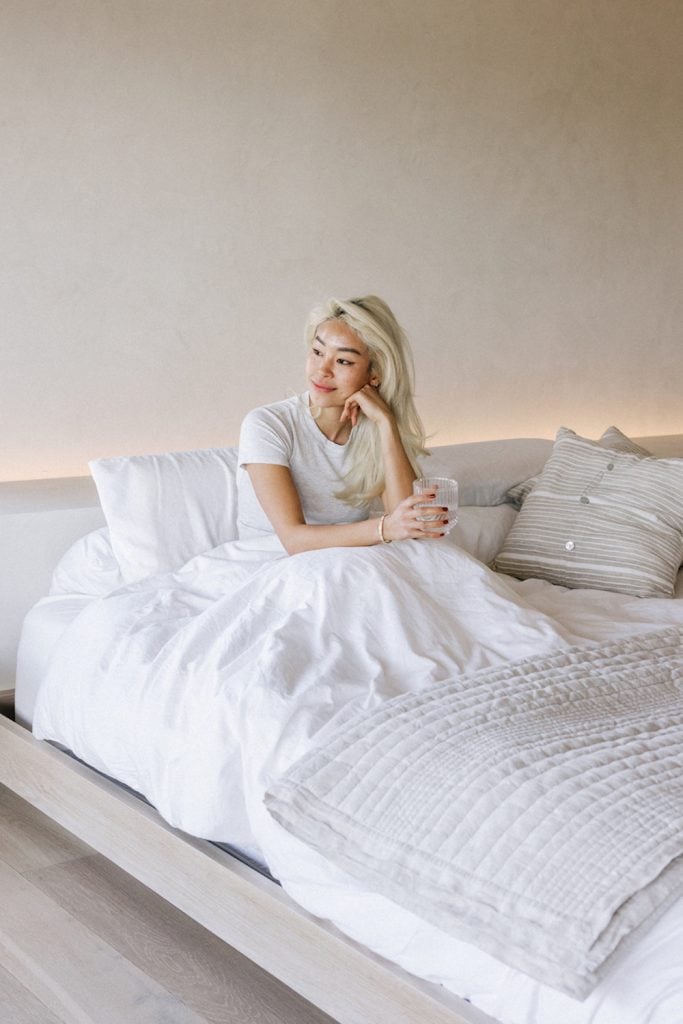
Tips for Promoting Restful Sleep Throughout the Day
PSA: It’s not only your nighttime habits that impact your sleep. All throughout the day, we can incorporate certain sleep-promoting habits that make it all the easier to wind down before bed. Preeti’s top daytime sleep practices include:
Get sunlight in the morning. Even just 15-30 minutes outside in the sun can help you wake up and reset your circadian rhythm. As we’ve shared on the topic previously, everything from artificial light to stress to jet lag can compromise your sleep quality. Getting a little morning sun is an easy and enjoyable way to combat this.
Limit caffeine and alcohol. “Both of these substances can stay in your system for some time and disrupt your sleep quality,” notes Preeti. We aim to cut caffeine off by the early afternoon and try to keep alcohol to weekends or special occasions. Preeti recommends avoiding alcohol within three hours of your bedtime and caffeine within five hours.
Wake up and go to bed at the same time. Every day—that means weekends, too! “Following a consistent sleep schedule trains your brain to recognize when it’s time to sleep and when it’s time to wake,” says Preeti. So if you’re tempted to take Saturday or Sunday to sleep in, it’ll be better for your body and mind in the long run if you get an early start. (But, of course, you’re welcome to take things slowly—with a coffee in hand.)
Ditch the tech at least 30 minutes before bedtime. Preeti encourages anyone looking to improve their sleep to turn off the television, power down your computer, and put your phone down. Screens and devices “emit bright blue light that your brain perceives as sunlight, tricking it into putting off sleep and staying awake longer than you’d like,” says Preeti. To make it easier on yourself, take the TV out of the bedroom and charge your devices downstairs (turned off). The more physical distance you put between yourself and your tech, the less tempting it is.
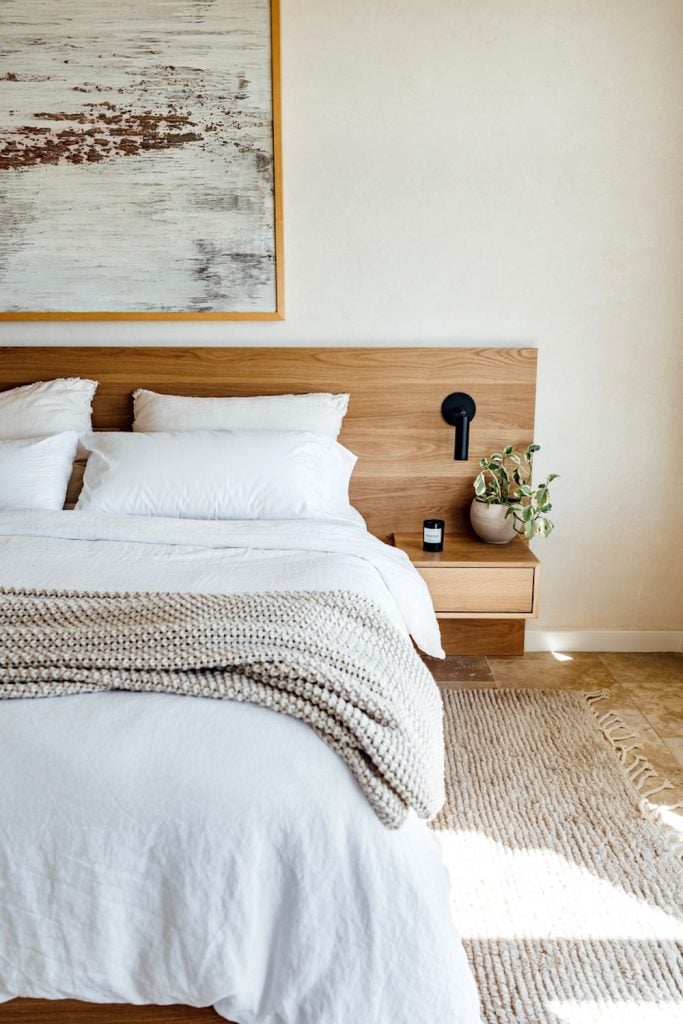
Stress and Sleep: How to Keep It Under Control
It’s no secret that stress can be one of the primary things keeping us up. Between deadlines, kids’ schedules, and the general busyness of our weeks, stress can easily disrupt our snooze schedule. Thankfully, as Preeti cites, there are healthy habits we can practice to keep it from interfering with our sleep.
Take a warm shower or bath. I used to be a morning shower person—and then I discovered truly how relaxing it can be to take a warm one at night. If you go the bath route, try a magnesium bath soak that’ll encourage muscle and mental relaxation. According to Preeti, a warm shower or bath “may help you relax, destress, and lower your body temperature, allowing you to fall asleep faster.”
Keep a journal. Journaling is a go-to method for calming our minds and getting aligned at the start and end of each day. Preeti appreciates it as a “brain dump,” which keeps racing thoughts at bay. If you’ve ever felt restless and anxious as soon as your head hits the pillow, it’s time to start journaling.
Get moving. Where sleep and stress are concerned, exercise is the perfect two-fer. It’s known to promote mindfulness and relaxation, thus relieving stress. Movement can also help you fall asleep faster and feel more energized throughout the day. Walking, yoga, Pilates—anything and everything counts.
Try a guided meditation. Another wonderful way to reduce stress and improve sleep? Meditation. Even just a few minutes can help you connect with your breath and slow your thoughts. Apps like Headspace, Calm, or Superhuman are all excellent places to start.
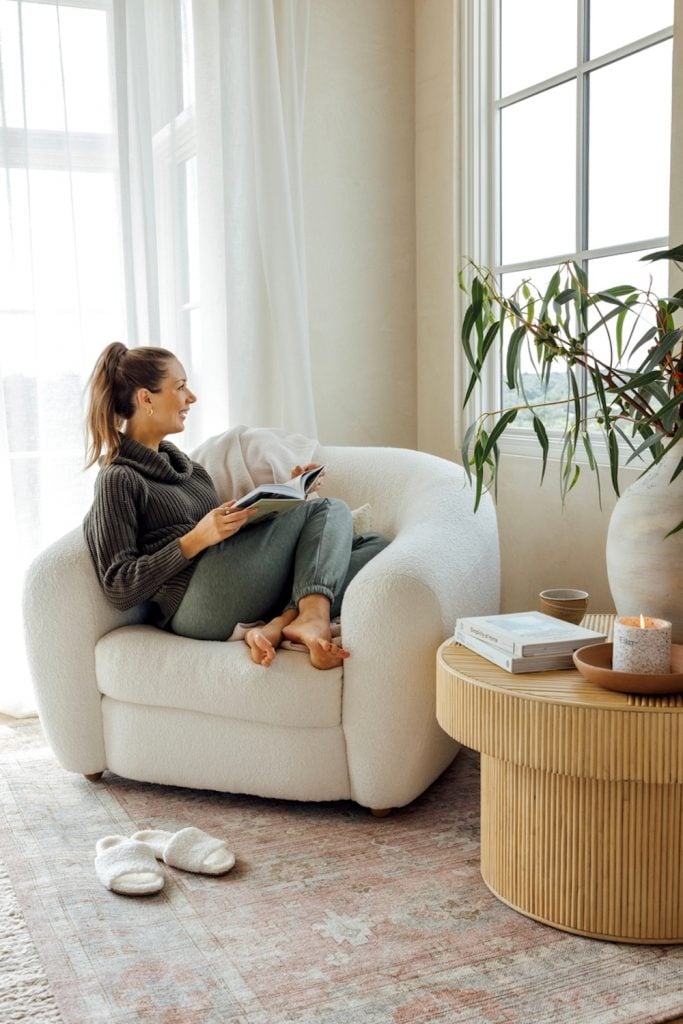
How to Beat Insomnia Naturally
While Preeti notes that there is no single central cause of insomnia, she notes that “research suggests that people with insomnia have psychological arousal at unwanted times that interfere with sleep.” What can this look like? Everything from increased heart rate and body temperature to hormone fluctuations (increased cortisol, specifically).
Preeti suggests focusing on optimized sleep hygiene, which includes:
- maintaining healthy lifestyle habits
- avoiding daytime naps
- limiting screentime
- keeping a consistent sleep schedule
But her number one tip for improving insomnia. “Pursuing cognitive behavioral therapy,” helps people manage their anxiety around sleep and encourages better sleep habits.
Tips for Creating a Restful Sleep Environment
When it comes to learning how to sleep better, never overlook the importance of a supportive sleep environment. You’ve heard it before: the bedroom should be used for sleep and sex. For a truly restorative sleep, power down the tech and follow Preeti’s tips.
Cool down. Repeat after me: blankets are best. Cooler temperatures between 65-68 degrees Fahrenheit are ideal. “Our body temperature naturally drops at night so this will help signal the body to get ready for sleep,” Preeti explains.
Diffuse essential oils. Lavender is perfect for creating a calming sleep environment.
Block out light. Black-out curtains and/or an eye mask keep light from interrupting your sleep.
Drown our noise. Earplugs or a white noise machine should get the job done.
The Best Products for Restorative Sleep
Every product is curated with care by our editors and we’ll always give an honest opinion, whether gifted or purchased ourselves. If you buy something through our links, we may earn a small commission at no cost to you.
Quince Cotton Slub Blackout Curtain
If you live in a city, you know just how necessary blackout curtains can be. Block out street lights, your neighbors, and even the moon on a super bright occasion. And while some blackout curtains look purely functional, these tie your calming, wabi-sabi aesthetic together perfectly.
Arrae Sleep
As I say to anyone who asks me about Arrae—come for viral the Bloat capsules, stay for the beyond-effective sleep supplement. Not only does it quickly whisk you off to sleep, but it helps you experience a deeper, quality snooze. Ingredients like chamomile, gaba, valerian root, and holy basil regulate your nervous system and calm anxiety for the best sleep of your life. Bonus: they’re formulated without melatonin, so you don’t have to worry about dependency.
Equilibria Sleep Gummies
When it comes to supplements, I usually skip over the gummies. Not simply because they usually taste… awful, but because they’re oftentimes weighed down with fillers and added sugars. Thankfully, Equilibria’s sleep gummies are formulated with ingredients like chamomile and L-theanine for a natural night’s sleep. Also: they’re delicious. Truly. Notes of Bordeaux cherry come through, making them a sweet and functional after-dinner treat.
Lunya Washable Silk Sleep Mask
I only recently purchased this sleep mask, and after that first night of blissful sleep, I asked: what took me so long? The luxurious, silky texture provides a cloud-like weight over your eyes, gently coaxing you toward a restful night well slept.
FluffCo Turn Down Room Spray
The way I’ll go to my grave buying this room spray for everyone as a gift. It’s an affordable little luxury that I keep on my nightstand at all times. Top notes of jasmine, bergamot, and neroli blend with patchouli and sandalwood for a sophisticated scent that invites you to rest up and rest well.
Moon Juice Magnesi-Om
It’s game over for all other magnesium powders now that Moon Juice has entered the scene. Formulated with three forms of magnesium plus L-theanine, it not only promotes sleep but also boosts brain health and supports regular bowel movements. Choose from blue lemon, berry, or both. I love sipping on this an hour or so before bed.
Intelligent Change Night Notes Journal
Do you go to sleep with a million thoughts milling about in your mind? Get it all out with this guided journal that offers space to record and analyze your dreams, jot down your creative ideas, and get a head start on tomorrow’s to-do list.


